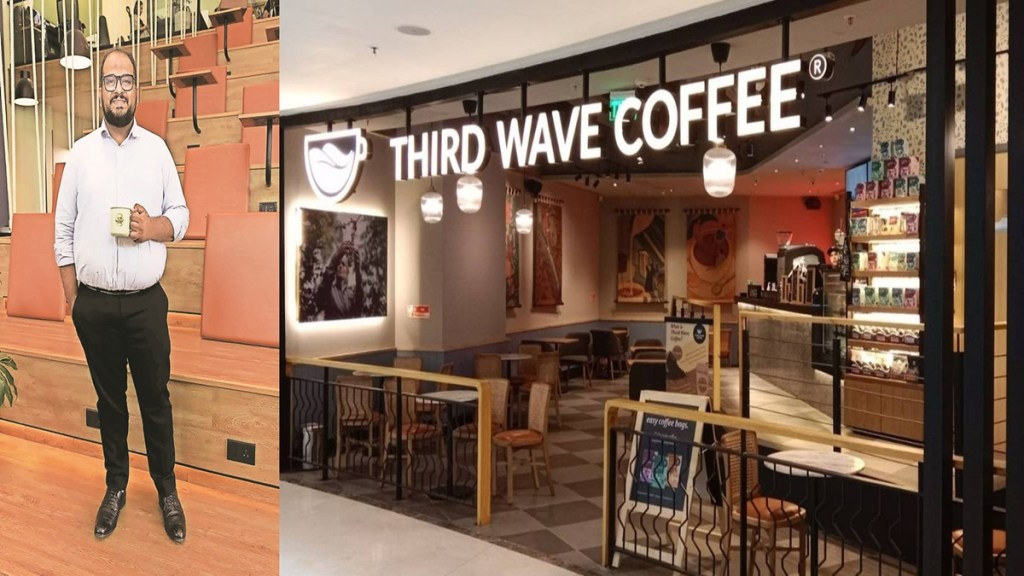From a garage in Bengaluru to over 165 cafes across India, Third Wave Coffee has carved a niche for itself in the speciality coffee space. In a conversation with FE, Anirudh Sharma, co-founder of Third Wave Coffee, talks about the brand’s journey, India’s evolving coffee palate, and what innovation looks like in a caffeine-fuelled future. Edited excerpts:
When did you realise India was ready for a coffee revolution?
It all started with a simple desire— Ayush (my co-founder) and I just wanted to open a coffee shop. We didn’t have a plan, or even experience in the coffee industry. But we were passionate. So we began by visiting cafés to understand customer behaviour, and travelled to coffee farms to learn how the journey starts at the source.
We started roasting coffee in a small garage in Bengaluru. Since we had no formal training in coffee roasting, we experimented and learned through trial and error. We arrived in the city in September 2015 and opened our first store exactly a year later. It took us a year to find clarity on what we wanted to offer, but by the sixth weekend, we already had a queue forming outside our doors.
Why did you choose Bengaluru as the launchpad?
At that time, Bengaluru was India’s coffee hub. From farmers to equipment suppliers, everything we needed was already there. It made sense logistically and culturally.
What’s the story behind the name ‘Third Wave Coffee’?
Coffee culture has evolved globally in three waves. The first wave was when coffee was seen purely as a commodity —think instant coffee. The second wave saw the rise of cafés, where people started going out to have baristas make their drinks. The third wave is about treating coffee as a speciality product, tracing its journey from farm to cup. It’s about quality, transparency and craft. That’s what we stand for—hence the name.
Since your launch in 2015, how have Indian coffee drinkers evolved?
We’re seeing two key trends—regular coffee drinkers are becoming more consistent, and non-coffee drinkers are becoming curious. When we enter a new market, we approach it with a dual mindset—catering to someone trying coffee for the first time and also to those looking for sophisticated experiences.
Starting out in a tea-loving nation must’ve come with its fair share of risks.
Definitely. Back then, India had only around 2,500 structured coffee shops. We didn’t have a Plan B. It was always Plan A—make this work, no matter what. Our mission was simple —make high-quality, delicious coffee accessible. We put our heart into understanding the consumer. Feedback was constant, and we kept evolving our offerings.
What goes into launching a new product?
It starts with understanding the origin and authenticity of the product. Then we analyse the competitive landscape and gauge consumer preferences. Then we develop the menu, break it down into ingredients and processes, and test everything thoroughly.
Where do you find inspiration?
Every cup of coffee should have balance, sweetness, and a lingering finish. If something’s off, we tweak the grind size, temperature, or brewing time. We keep adjusting until it meets our internal benchmark of quality.
You recently introduced bubble tea to your menu. Is it just a trend, or do you see long-term potential?
I first tried bubble tea in Vietnam in 2018 and was hooked. When I went back six years later, I saw even more shops—it’s grown massively. Bubble tea is more than a beverage—it’s an experience. We see this becoming a staple, not just a trend.
With 165 cafés across 12 cities, you’ve surpassed your FY25 target. What’s next in terms of expansion?
Right now, we’re focused on deepening our presence in current markets, especially Tier I cities. We have 38 stores in Delhi-NCR. The priority is to densify other northern Indian cities before moving to Tier II and Tier III locations. International expansion is not on the cards yet. India still has untapped potential.
Many brands compromise on quality as they scale. How do you maintain consistency across 100+ locations?
It starts with how the product is designed. Every product must be scalable. Beyond that, training is crucial. We offer both online and offline training to baristas. Some of our modules are in short, reel-style videos, followed by quick assessments on mobile. This structure helps us maintain a high standard of consistency.
You recently launched 11 stores across five cities in one day. How did that come together?
It was the result of incredible teamwork. Every team—operations, supply chain, design, marketing—came together with one vision: grow into a strong coffee brand with great quality. That kind of scale in one day was not only a milestone, but also a testament to our systems and people.
The Indian speciality coffee space is crowded. What sets Third Wave Coffee apart?
We stick to what we started with—serving consumers with great experience. Other than that innovation has been our strongest vertical.
You mentioned innovation. How central is it to your brand, and what’s the process like?
Innovation is non-negotiable for us. We have an innovation lab in Bengaluru where we test all new beverages, food and bakery products. We also have our own roastery, where we experiment with different coffee beans and profiles.
Our annual innovation calendar is built around seasons and events—starting from summer, through the monsoon, Diwali, Halloween, Christmas, Valentine’s Day, and Holi. Each occasion brings a chance to try new ideas.

